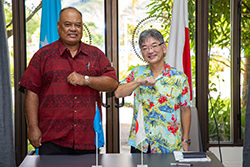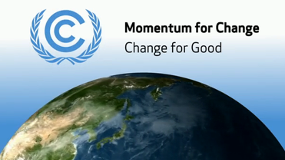Pohnpei-wide Mangrove Vulnerability Assessment completed
- Details
- Category: News
- Published: Wednesday, 28 April 2021 22:01
- Written by Bill Jaynes
- Hits: 43728
Micronesia Conservation Trust
 Pohnpei—Mangroves are vital to the communities of Micronesia, and especially Pohnpei. They filter water from sediment and unnecessary nutrients, host nursery habitat for fish, crabs and other marine life, provide livelihoods and protect coastal communities from storms and storms surges. Mangrove ecosystems are vital to the survival of Pohnpeian communities by keeping them resilient and protecting them from the impacts of climate change and global warming such as more frequent droughts, flooding and saltwater inundation into farmlands. However, today, our mangroves are being threatened not just by climate change, but also human impacts such as dredging and landfills.
Pohnpei—Mangroves are vital to the communities of Micronesia, and especially Pohnpei. They filter water from sediment and unnecessary nutrients, host nursery habitat for fish, crabs and other marine life, provide livelihoods and protect coastal communities from storms and storms surges. Mangrove ecosystems are vital to the survival of Pohnpeian communities by keeping them resilient and protecting them from the impacts of climate change and global warming such as more frequent droughts, flooding and saltwater inundation into farmlands. However, today, our mangroves are being threatened not just by climate change, but also human impacts such as dredging and landfills.
On February 25th, 2021, the Micronesia Conservation Trust (MCT), its local partners including the FSM National Department of R&D, The Nature Conservancy (TNC) Micronesia Program, the Conservation Society of Pohnpei (CSP) and Pohnpei State Department of R&D, held a webinar with the United States Forest Service (USFS), the United States Geological Survey (USGS) and the University of Tasmania (UTAS) to discuss the findings and recommendations from this 5 year long vulnerability assessment that covered almost all the mangrove areas in Pohnpei. Specifically, during the meeting, the US federal agencies and the UTAS shared the outcomes of the data they had gathered and analyzed on the status of Pohnpei’s mangroves over the past 5 years. The outcomes of the project include an island wide Mangroves Vulnerability Assessment, and climate change prediction analysis for the island of Pohnpei (called a WARMER Mode). Additionally, the report included a Forest Inventory & Analysis (FIA) and the ongoing Surface Elevation Table (rSET) for the Pohnpei State. Emphasis was on presenting the methodologies, results and management recommendations that could be used to continue to protect the ecosystem services provided by Pohnpei's vast mangrove system. A key finding of both reports concluded that while climate change and sea-level rise are going to be the long-term threats to the health and viability of Pohnpei’s mangroves, human impacts such as dredging, pollution, and coastal development are currently the major threats to Pohnpei’s mangroves.
To continue the discussions locally, the Conservation Society of Pohnpei and its partners are preparing for the 2nd Mangrove Conference on March 17th -18th, 2021. This conference is meant to provide the outcomes of the ongoing initiative including recommendations to the Pohnpei State Government, resource managers, local governments, traditional leaders and communities to encourage dialogue that will help identify the most effective and appropriate mangrove management strategies for Pohnpei.
Add a comment



 The FSM Fisheries and Maritime Institute (FMI) is located in Yap and operated by the College of Micronesia FSM. It offers majors in Navigation, Marine Engineering, and Fishing Technology.
The FSM Fisheries and Maritime Institute (FMI) is located in Yap and operated by the College of Micronesia FSM. It offers majors in Navigation, Marine Engineering, and Fishing Technology.

